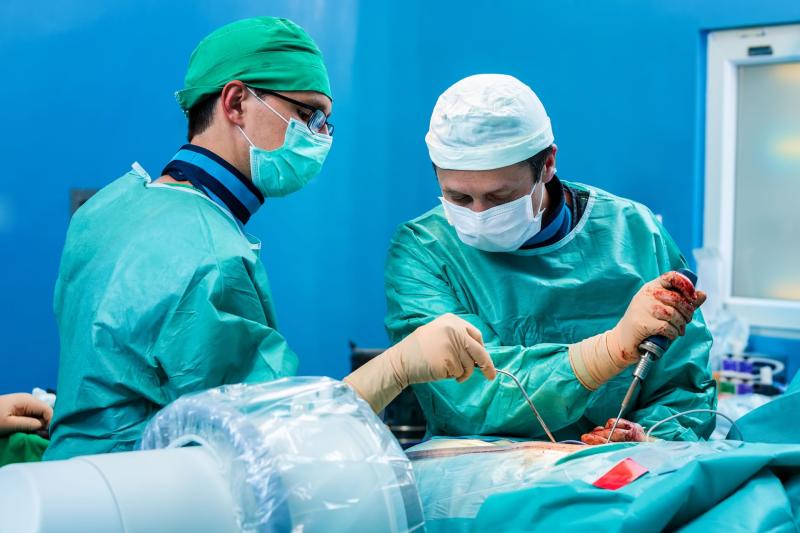What are the types of orthopedic surgeons?
Orthopedic surgery is a diverse field, and orthopedic surgeons often specialize in specific areas of the musculoskeletal system. Here are some common types of orthopedic surgeons and their specializations:
Orthopedic Trauma Surgeon: Specializes in treating fractures, dislocations, and injuries resulting from accidents or trauma.
Joint Replacement Surgeon: Focuses on replacing damaged joints, commonly performing hip and knee replacement surgeries.
Spine Surgeon: Specializes in treating conditions affecting the spine, such as herniated discs, spinal stenosis, or deformities like scoliosis.
Hand Surgeon: Specializes in the diagnosis and treatment of hand and upper extremity conditions, including fractures, tendon injuries, and carpal tunnel syndrome.
Foot and Ankle Surgeon: Addresses conditions related to the foot and ankle, such as fractures, arthritis, and deformities.
Sports Medicine Surgeon: Specializes in treating sports-related injuries, including ligament tears, muscle strains, and fractures incurred during athletic activities.
Pediatric Orthopedic Surgeon: Focuses on musculoskeletal issues in children, treating conditions like congenital abnormalities, developmental disorders, and fractures.
Orthopedic Oncologist: Specializes in the treatment of bone tumors and musculoskeletal cancers.
Orthopedic Hand Surgeon: Specializes specifically in surgical procedures related to the hand and wrist.
Orthopedic Shoulder and Elbow Surgeon: Focuses on conditions affecting the shoulder and elbow joints, including rotator cuff tears and tennis elbow.
Orthopedic Hip Surgeon: Specializes in hip-related conditions, such as hip arthritis and hip fractures.
Orthopedic Knee Surgeon: Focuses on knee-related conditions, including ligament injuries, meniscal tears, and arthritis.
Orthopedic Foot and Ankle Surgeon: Specializes in surgical interventions for conditions affecting the feet and ankles, such as bunions, fractures, and Achilles tendon injuries.
Musculoskeletal Oncologist: Specializes in the treatment of bone and soft tissue tumors.
Hand and Upper Extremity Surgeon: Similar to a hand surgeon, this specialist focuses on conditions of the hand and upper extremities, including the shoulder and elbow.
These are just some of the specialized areas within orthopedic surgery. It's important to note that orthopedic surgeons may further sub-specialize within these categories to provide more focused and expert care in specific areas of the musculoskeletal system.
Diversifying Expertise: Exploring Orthopedic Subspecialties
The world of orthopedic surgery is far from a homogeneous field. Within this realm, various subspecialties exist, each focusing on specific areas of the musculoskeletal system and honing unique skills to tackle diverse conditions and injuries. Let's delve into the fascinating world of orthopedic subspecialties and understand how they differ.
1. Types of Orthopedic Surgeons:
- Foot and Ankle: Masters of the lower extremities, treating foot and ankle fractures, tendonitis, bunions, and sports injuries.
- Hand and Wrist: Experts in the intricate world of the hand, managing carpal tunnel syndrome, trigger finger, fractures, and arthritis.
- Joint Replacement: Specialists in replacing worn-out hip, knee, shoulder, and other joints with artificial implants, restoring mobility and pain-free movement.
- Pediatric Orthopedics: Focused on treating musculoskeletal conditions in children, addressing birth defects, developmental issues, and sports injuries.
- Spine Surgery: Specialize in diagnosing and treating complex spinal problems like herniated discs, scoliosis, spinal stenosis, and spinal cord injuries.
- Sports Medicine: Manage a wide range of sports-related injuries, from ACL tears and muscle strains to overuse injuries, aiming for optimal recovery and return to play.
- Trauma Surgery: Experts in managing acute fractures, dislocations, and other musculoskeletal injuries resulting from accidents or falls.
- Orthopaedic Oncology: Specialize in diagnosing and treating tumors of the bones and soft tissues, using surgical and non-surgical approaches.
2. Differences in Subspecialties:
Each subspecialty has its own:
- Focus: Specific anatomical area or type of injury/condition.
- Procedures: Specialized surgical techniques and interventions.
- Training: Additional fellowship training following residency to develop expertise.
- Knowledge base: In-depth understanding of the specific anatomy, physiology, and pathology of their focus area.
3. Areas of Specialization:
- Foot and Ankle: Focus on the foot, ankle, and lower leg, including bones, joints, ligaments, and tendons.
- Hand and Wrist: Specialize in the intricate structures of the hand and wrist, from bones and joints to nerves and tendons.
- Joint Replacement: Expertise in joint anatomy, biomechanics, and surgical techniques for implanting artificial joints.
- Pediatric Orthopedics: Understand the unique challenges of growing bones and developing musculoskeletal systems in children.
- Spine Surgery: Focused on the complex anatomy and biomechanics of the spine, mastering sophisticated surgical techniques.
- Sports Medicine: Possess advanced knowledge of sports-related injuries, rehabilitation, and performance optimization.
- Trauma Surgery: Expertise in emergency management of acute musculoskeletal injuries and rapid stabilization.
- Orthopaedic Oncology: Deep understanding of tumor biology, surgical techniques, and multimodal treatment approaches for bone and soft tissue tumors.
4. Varying Expertise:
- Foot and Ankle surgeons: Skilled in minimally invasive foot surgery and complex ankle reconstructions.
- Hand and Wrist surgeons: Experts in microsurgery and intricate nerve and tendon repairs.
- Joint Replacement surgeons: Masters of implant selection, surgical techniques, and joint biomechanics.
- Pediatric Orthopedic surgeons: Adept at managing growth plate fractures, congenital anomalies, and developmental disorders.
- Spine surgeons: Proficient in minimally invasive spinal fusion, microsurgical techniques, and complex spinal reconstructions.
- Sports Medicine surgeons: Specialists in arthroscopic surgeries, sports-specific rehabilitation, and injury prevention strategies.
- Trauma surgeons: Experts in rapid fracture fixation, limb salvage, and complex trauma management.
- Orthopaedic Oncologists: Adept at surgical tumor resection, reconstruction, and multimodal treatment planning.
5. Conditions and Injuries:
- Foot and Ankle: Fractures, sprains, Achilles tendon tears, bunions, hammertoes, diabetic foot complications.
- Hand and Wrist: Carpal tunnel syndrome, trigger finger, fractures, tendonitis, nerve injuries, arthritis.
- Joint Replacement: Degenerative arthritis, hip dysplasia, avascular necrosis, severe joint injuries.
- Pediatric Orthopedics: Scoliosis, hip dysplasia, clubfoot, fractures, cerebral palsy, sports injuries.
- Spine Surgery: Herniated discs, spinal stenosis, scoliosis, spondylolisthesis, spinal cord injuries, tumors.
- Sports Medicine: ACL tears, meniscal tears, muscle strains, overuse injuries, ligament sprains, concussions.
- Trauma Surgery: Fractures, dislocations, amputations, crush injuries, pelvic and acetabular fractures, open wounds.
- Orthopaedic Oncology: Bone tumors, soft tissue tumors, metastatic tumors, tumor reconstruction, limb salvage.
Remember, this is just a brief overview of the diverse world of orthopedic subspecialties. Each subspecialty offers unique expertise and












